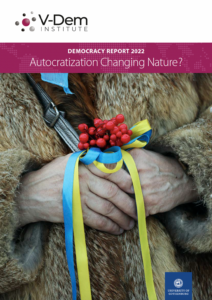 Liberal democracy is back to where it was in 1989, says the most recent report from the Varieties of Democracy Institute (V–Dem) – in other words, the massive gains in expanding human freedom since the demise of global communism have been reversed, as if the costly struggle of the Cold War was all for nothing, notes Jamie Shea, former NATO Deputy Assistant Secretary General and Senior Fellow for Peace, Security and Defence at Friends of Europe.
Liberal democracy is back to where it was in 1989, says the most recent report from the Varieties of Democracy Institute (V–Dem) – in other words, the massive gains in expanding human freedom since the demise of global communism have been reversed, as if the costly struggle of the Cold War was all for nothing, notes Jamie Shea, former NATO Deputy Assistant Secretary General and Senior Fellow for Peace, Security and Defence at Friends of Europe.
There are three reasons why liberal democracy seems to need increasing amounts of intensive care, he writes:
- First, there is the erosion of democratic norms and standards in the established democracies as step–by–step human and civil rights are curtailed, governments bypass parliaments, the media are bullied and “the will of the people” (i.e. “those who support and vote for me”) is invoked to justify the disregarding of alternative or minority views and interests….
-

National Endowment for Democracy (NED)
Second, more democracies are turning definitively into autocracies rather than soldering on as a messy combination of both. …. Ultimately, as in Viktor Orban’s Hungary, authoritarian leaders stop pretending that they are applying democratic standards, albeit according to their own conception of what these mean, and come clean about their contempt for liberal institutions and values….
- Third, established autocracies are radicalizing into totalitarian states reminiscent of the 1930s. Opponents are not merely denounced but poisoned, imprisoned or forced into exile. The state becomes more aggressively nationalistic and resorts more readily to the use of force to crush foreign rivals that, it is alleged, threaten its own compatriots with ‘genocide’.
But China and Russia are giving authoritarianism a bad name, Thomas L. Friedman writes for The Times:
High-coercion authoritarian systems are low-information systems — so they often drive blind more than they realize. And even when the truth filters up, or reality in the form of a more powerful foe or Mother Nature slams them in the face so hard it can’t be ignored, their leaders find it hard to change course because their claims to the right to be presidents-for-life rest on their claims to infallibility. And that is why Russia and China are both now struggling.

The problems facing democracy run deeper than the rise of authoritarian and populist ‘strongmen’, according to the authors of a new book.
They say that liberal societies are witnessing the long-term “degeneration” of their cultural and moral foundations. Wealth inequality and economic stagnation have exacerbated political divisions, but a bigger problem is the fraying of the civic solidarity that knits citizens together across lines of difference, heightening the experience of disempowerment, G. John Ikenberry notes in a review of Degenerations of Democracy, by Craig Calhoun, Dilip Parameshwar Gaonkar, and Charles Taylor:
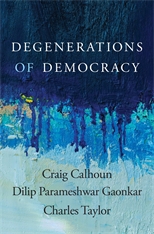 Citizens no longer feel that they are participants in a political system thanks to the breakdown of social institutions such as trade unions, churches, youth sports leagues, and social service associations. The authors stress the importance of a shared identity to generate “social inclusion.” This works as a sort of invisible glue without which inherent dysfunctions and divisions in society become more apparent.
Citizens no longer feel that they are participants in a political system thanks to the breakdown of social institutions such as trade unions, churches, youth sports leagues, and social service associations. The authors stress the importance of a shared identity to generate “social inclusion.” This works as a sort of invisible glue without which inherent dysfunctions and divisions in society become more apparent.
The authors argue that the key to reversing the degeneration is to think of democracy as a centuries-old political project, he writes for Foreign Affairs, that survived in earlier eras through political movements and coalitions that made societies more inclusive and responsive to human welfare.
Advanced liberal states are striving to build multiethnic, multi-religious democracies – a historically unprecedented challenge, argues Yascha Mounk, an associate professor of the Practice of International Affairs at Johns Hopkins University, founder of Persuasion, and a contributor to the National Endowment for Democracy’s Journal of Democracy.
They can do so by cultivating George Orwell’s cultural patriotism, an inclusive ethos at odds with chauvinist, exclusionary forms of nationalism, he writes in his latest book, The Great Experiment: Why Diverse Democracies Fall Apart and How They Can Endure.*
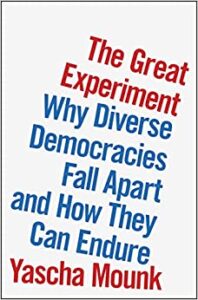 The advantages of civic patriotism are significant, Mounk writes for The Wall Street Journal:
The advantages of civic patriotism are significant, Mounk writes for The Wall Street Journal:
Unlike ethnic nationalism, it allows anybody who is willing to embrace a set of shared political values to become a full member of the community. So long as immigrants from such different places as Morocco, Thailand, Zimbabwe and El Salvador agree to abide by the Constitution, they should be able to live together in peace—and become as American as a White Anglo-Saxon Protestant whose forefathers arrived on these shores hundreds of years ago.
“We’re seeing today in Ukraine that patriotism—for all its dangers—can also be a force which inspires millions of people to risk their lives to resist a dictator and fight for their independence, fight for their ability to self-govern,” he tells The Daily Beast’s Anthony Fisher.
Yet a number of trends are driving democratic decay and fueling the attractiveness of the authoritarian alternative, O’Shea adds:
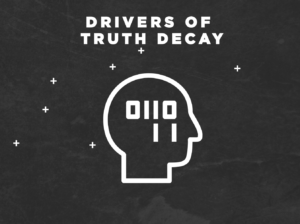 The first is what the RAND Corporation calls “truth decay”. Democracy dies through lies. Usually, propaganda and alternative realities are the hallmarks of closed societies where alternative and corrective sources of information are lacking or suppressed. That explains why 80% of Russians, according to some domestic polls, support Putin’s invasion of Ukraine. They watch state TV and only ever see one side of the story. Yet systemic lying is now creeping into established democracies as politicians realise that they can distort or deny the facts with no fear of public censure. ….
The first is what the RAND Corporation calls “truth decay”. Democracy dies through lies. Usually, propaganda and alternative realities are the hallmarks of closed societies where alternative and corrective sources of information are lacking or suppressed. That explains why 80% of Russians, according to some domestic polls, support Putin’s invasion of Ukraine. They watch state TV and only ever see one side of the story. Yet systemic lying is now creeping into established democracies as politicians realise that they can distort or deny the facts with no fear of public censure. ….
- The corollary of lies is disinformation and propaganda. … In this way, disinformation prevents societies from moving forward by locking politics up into nostalgia for an imaginary past and irrelevant debates on secondary issues like national identity or pride. By preventing democracy from functioning, disinformation thus moves to the next level: presenting democracy as inherently dysfunctional.
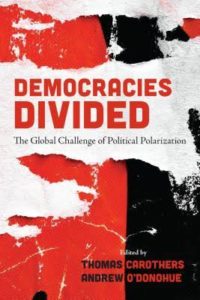 The third element is polarization. Autocrats thrive by dividing society into two enemy camps: us against them…. In the world of polarization, patriotism is to the party or group, not to the country. Governing and decision–making can take place only on the basis of strict majority voting along partisan lines, as coalition building is virtually impossible. Since each camp uses its time in office to reverse or cancel everything that its predecessor has done, again societies become blocked and lose their capacity to address truly massive challenges ….
The third element is polarization. Autocrats thrive by dividing society into two enemy camps: us against them…. In the world of polarization, patriotism is to the party or group, not to the country. Governing and decision–making can take place only on the basis of strict majority voting along partisan lines, as coalition building is virtually impossible. Since each camp uses its time in office to reverse or cancel everything that its predecessor has done, again societies become blocked and lose their capacity to address truly massive challenges ….- Finally, we have the demise of the traditional political party. In the first round of the French presidential elections, the two parties that dominated French politics after the Second World War and supplied nearly all the presidents of France under the 4th and 5th Republics, namely the Socialist Party and the post-Gaullist centre–right, received together less than 7% of the vote. …. The collapse of traditional political parties is not good news for democracy as they are being replaced by ‘national rallies’, which are little more than plebiscites for a single charismatic leader. ….. As traditional parties decline, more votes gravitate towards the extremes. Tactical voting against someone or something becomes more important than positive voting for a political project.
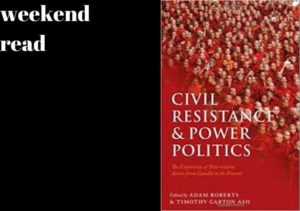 How is authoritarianism effectively opposed and democracy strengthened? An established body of research finds that civil resistance movements—using actions such as strikes, boycotts, noncooperation, and other nonviolent tactics—are one of the most powerful drivers of democratic gains worldwide, argues Hardy Merriman, a Senior Advisor to the International Center on Nonviolent Conflict (ICNC), and a Nonresident Senior Fellow at the Atlantic Council.
How is authoritarianism effectively opposed and democracy strengthened? An established body of research finds that civil resistance movements—using actions such as strikes, boycotts, noncooperation, and other nonviolent tactics—are one of the most powerful drivers of democratic gains worldwide, argues Hardy Merriman, a Senior Advisor to the International Center on Nonviolent Conflict (ICNC), and a Nonresident Senior Fellow at the Atlantic Council.







